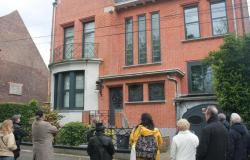That afternoon was the third time the group met. All participants suffer from multiple sclerosis and are followed at the day hospital (HDJ) of the medical department of Draguignan hospital. Magali Ceglia, the HDJ nurse, supervises these meetings with Catherine Charbonnier and Bénédicte Gorny, the two Var delegates of the French multiple sclerosis association (AFSEP), which supports patients and their caregivers (1).
A first round of discussion allows everyone to introduce themselves and explain what they expect from the meeting. There are those, like Sandrine (2) who have years of experience with the disease. She has undergone different treatments, no longer counts physiotherapy sessions and from the outset, she motivates the group: “You must not give up.” Others, like Lydie, are novices. “I was diagnosed a few months ago. I’m looking for information.”
The appearance of the group corresponds well to the reality of the disease, which mainly affects women: there is only one man, a forty-year-old, among patients of all ages. Some only discovered their illness in their fifties; others, like Laura, when they were just adults. “I had to fight to complete my studies successfully,” she confides.
“Permanent fatigue”
All of them have in common that they have experienced a more or less long period of medical wandering, before finally benefiting from the correct diagnosis (and the follow-up that goes with it). “I had all the symptoms for a long time; I lived for years with MS without knowing. It was the physiotherapist who finally referred me”confides Géraldine.
Their second point in common: “A permanent fatigue that I feel all the time”testifies a first patient; “periods of physical exhaustion which affect morale”, confirms for a second. A third concludes, as a warning to those entering into the disease: “This fatigue that is so often present encourages me to do a little too much when I’m well, even if it means paying a high price afterwards! You have to know how to listen to yourself and not overdo it.” However, taking care not to stop everything. “The more I rest, the more pain I get. Physical activity is essential.”
Social and professional difficulties
The conversation continues, the topics follow one another. We come to talk about work. “I was dismissed for incapacity, I obtained recognition as a disabled worker, but I have been unemployed for almost a year and have taken steps to retrain. I find that things are not progressing not quickly. It’s a matter of anxiety.”confides Nathalie. “AFSEP can help you answer these types of questions, his two delegates then intervene. We can put you in touch with people who can support you.”
Another patient bounces back: “I have not yet completed my MDPH (3) file for disabled worker recognition. For the moment it is still going well…”
“Do it right away, advises Nathalie. The process is long, you have to anticipate.” Olivier comments: “I am lucky to be independent, I can adapt my working pace. Otherwise, I would have had to stop.”
The look of the others
The conversation deviates again: the group discusses the way others see them, the difficulty in making one’s illness understood, invisible handicaps. “The image of the wheelchair associated with illness is still very present”, confirms the nurse. She questions Dr Damien Muguet, the neurologist who supervises the HDJ, who came to listen to the discussions on this subject. Of the sixty patients he follows, only one person is in a wheelchair…
“There are those who think we are acting and those who worry too much. We need to reassure those around us a lot”notes Sandrine. “It’s true, jokes Olivier, delivering a tip that [sa] woman will read in the newspaper” : “I always try to walk behind her, so she doesn’t see if I’m struggling!” Tongues are loosened. He is not the only one to mask symptoms so as not to worry those close to him.
The meeting comes to an end. That’s when Laura starts: to deal with her urinary problems, her urologist suggests she do self-catheterization. “I find it very intrusive. I would like feedback, to know what this really changes in terms of quality of life.” Olivier intervenes: “I admit, it’s less stressful for me to have to find a toilet.” He is immediately interrupted by the laughter of the participants. “It’s definitely a little different for men!”
“The nice side is that we manage to play down the drama, Olivier concludes aside at the end of the meeting. Good humor and self-deprecation are essential to cope.” So does the support of a peer group.
1. AFSEP: Bénédicte Gorny 06.51.92.91.90. and Catherine Charbonnier 06.13.60.40.87.
2. Patient first names have been changed.
3. Departmental home for disabled people (MDPH).






